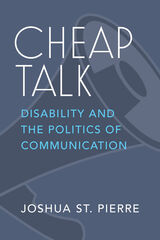

One person can't help stuttering. The other can't help laughing. And in the way one bodily betrayal of better intentions mirrors the other, we find ourselves in the gray area where mind and body connect--and, at the damnedest moments, disconnect. In a book that explores the phenomenon of stuttering from its practical and physical aspects to its historical profile to its existential implications, Marc Shell plumbs the depths of this murky region between will and flesh, intention and expression, idea and word. Looking into the difficulties encountered by people who stutter--as do fifty million worldwide--Shell shows that, however solitary stutterers may be in their quest for normalcy, they share a kinship with many other speakers, both impeded and fluent.
Stutter takes us back to a time when stuttering was believed to be "diagnosis-induced," then on to the complex mix of physical and psychological causes that were later discovered. Ranging from cartoon characters like Porky Pig to cultural icons like Marilyn Monroe, from Moses to Hamlet, Shell reveals how stuttering in literature plays a role in the formation of tone, narrative progression, and character. He considers such questions as: Why does stuttering disappear when the speaker chants? How does singing ease the verbal tics of Tourette's Syndrome? How do stutterers cope with the inexpressible, the unspeakable?
Written by someone who has himself struggled with stuttering all his life, this provocative and wide-ranging book shows that stuttering has implications for myriad types of expression and helps to define what it means to be human.


Stuttering in Children and Adults was first published in 1955. Minnesota Archive Editions uses digital technology to make long-unavailable books once again accessible, and are published unaltered from the original University of Minnesota Press editions.
One of the largest groups of handicapped people in the world today is made up of the estimated fifteen million persons who stutter. Their predicament has been one of man's most baffling problems ever since it was first recorded by the ancients, but not until the present century has the mystery of stuttering showed any signs of lifting.
The studies collected in this volume represent a substantial step toward the solving of the mystery. The University of Iowa, a pioneer in research on the causes and treatment of stuttering, has carried on its work for many years. This book presents all previously unpublished papers and dissertations (a total of forty-three) that have resulted from this research program.
Much of the work centers on the onset of stuttering in children and underlies the theory that stuttering begins with the hearer rather than the speaker. Interrelationships between personality and stuttering have been investigated, a search has been made for a possible physical basis for stuttering, conditions affecting severity of stuttering have been studied, and research on therapy has been attempted.
This is an important book for psychologists, educators, social workers, physicians, parents, and others concerned with speech disorders. For those who devote their full effort to the problems discussed—the specialists in speech pathology and therapy—the book is essential.
READERS
Browse our collection.
PUBLISHERS
See BiblioVault's publisher services.
STUDENT SERVICES
Files for college accessibility offices.
UChicago Accessibility Resources
home | accessibility | search | about | contact us
BiblioVault ® 2001 - 2024
The University of Chicago Press









